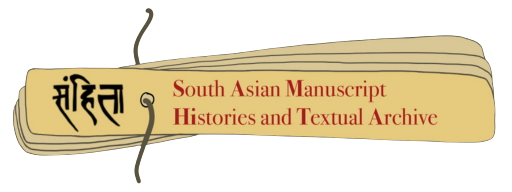Manuscripts
Search Filter
Bhāminīvilāsa
112494_V054A_4228_CS Language : Sanskrit Scripts : Devanagari
"A Kāvya text by Jagannāthapaṇḍita (1590–1665), a Telugu Brāhmin of Veṅgināḍakula, and son of Peru (Perama) Bhaṭṭa and Lakṣmī. He studied under his father and was honoured as ‘Paṇḍitarāja’ by the emperor Sahjahan. The work contains four vilāsas: Prāstāvika, Śṛṅgāra, Karuṇa and Śānta."
Śrīstava and Daśāvatārastotra
112495_V055A_4229_CS Language : Sanskrit Scripts : Devanagari
"Śrīstava is a composition of 10 verses saluting Goddess Lakṣmī. It was composed in 1039 by Kureśa, also known as Śrīvatsāṅka Miśra or Kūratālvār, son of Rāmamiśra and pupil of Rāmānujācārya. He was from the Kūram agrahāra near Kāñcī. Daśāvatārastotra is a salutation to the ten incarnations of Viṣṇu, composed by Vedāntadeśika, also known as Veṅkaṭanātha, son of Ananta Sūri and Totārāmbā, who was born in 1268 in Tūppul near Kāñcī. This text is incomplete."
Sāṃkhyārthatattvapradīpikā
112499_V056A_4230_CS Language : Sanskrit Scripts : Devanagari
"A text on Sāṃkhya doctrine based on Tattvasamāsa by Keśava Bhaṭṭa, son of Sadānanda and grandson of Keśava Bhaṭṭa."
Vijayāpaddhati
112500_V057A_4231_CS Language : Sanskrit Scripts : Devanagari
"A collection of mantras and corresponding nyāsas in Sanskrit and Hindi. This manuscript appears to be in the same hand as MS 112499_V056A_4230_CS."
Dattātreyatantra
112501_V058A_4232_CS Language : Sanskrit Scripts : Devanagari
"A tantra text attributed to Dattātreya, legendary sage and son of Atri and Anasūyā, who was worshipped as an incarnation of Viṣṇu, and has many works ascribed to him. It is composed as dialogue between Śiva and Dattātreya. This manuscript has only two and a half chapters (paṭalas) out of 22."
Pañcamukhīhanumatkavaca
112504_V059A_4233_CS Language : Sanskrit Scripts : Devanagari
A stotra text saluting Hanumāna. Various sources are listed, the most popular being the Sudarśanasaṃhitā.
Madanasañjīvana
112508_V060A_4234_CS Language : Sanskrit Scripts : Devanagari
A bhāṇa composed by Ghanaśyāma also known as Āryaka or Cauṇḍāji Panth when he was 26 years old, in 1732. He was born in 1709 in Maharashtra and lived in Tanjore as a minister of King Tukkoji I (1729–1734). He was son of Mahādeva and Kāśī; his wives Kamalā and Sundarī also wrote in Sanskrit.
Kuvalayānanda
112510_V061A_4235_CS Language : Sanskrit Scripts : Devanagari
A text on alaṁkāra by Appayya Dīkṣita (1520–1593). He was born in Adayapalam, and composed over hundred books on Advaitavedānta, Mīmāṃsā, Śaiva theology, literary theory, 53 grammar, and the study of the epics. This work is based on the fifth chapter of Jayadeva’s Candrāloka, in the style of kārikā and vṛtti.
Rasamañjarī
112512_V062A_4236_CS Language : Sanskrit Scripts : Devanagari
A work on alaṅkāra in 135 verses, composed by Bhānudatta Miśra, son of Gaṇapati and grandson of Mahādeva, who was from Mithila and lived c. 1350–1450. The text focuses on rasa in Sanskrit literature.
Taraṅgiṇī
112513_V063A_4237_CS Language : Sanskrit Scripts : Devanagari
A commentary by Mukundabhaṭṭa (1830) on Tarkāmṛta of Jagadīśabhaṭṭa. The manuscript is incomplete. In keeping with Nyaya doctrine, it discusses elements starting with padārtha and going up to abhāva (the seventh and last type of padartha), but does not include further sub-categories.
Rādhāvinodakāvya
112515_V064A_4238_CS Language : Sanskrit Scripts : Devanagari
A Sanskrit kāvya by Rāmacandra Kavi, son of Janārdana and grandson of Puruṣottama, resident of Ganjam (Odisha). Some scholars claim he was from Mithila. This text has 19 verses, inspired by the love story of Srīkṛṣṇa and Rādhā. Anuprāsa alaṁkāra or alliteration is used throughout.
Rādhāvinodakāvyaṭīkā
112516_V065A_4239_CS Language : Sanskrit Scripts : Devanagari
A commentary on Rādhāvinodakāvya by Rāmacandra Kavi, son of Janārdana and grandson of Puruṣottama, resident of Ganjam (Odisha). Some scholars claim he was from Mithila. This text has 19 verses, inspired by the love story of Srīkṛṣṇa and Rādhā. Anuprāsa alaṁkāra or alliteration is used throughout.













